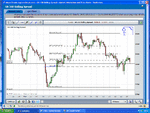hey DL ...
that for those very, very subtle pearls of wisdom 😆
Here are my thoughts regarding SIM trades etc…. I have been trading full-time for a little over 18mths with a live account (not a long time I know) and here’s some of what I have learnt so far.
I would say that learning the technical analysis was the first part in learning to trade. For me that part was quite time consuming as its alien and it takes time for you to train your eyes to read charts etc…. Plus I looked at and worked with quite a few methods until I found 1 or 2 that I was happy with. I went through around 65 trading books during that time. The next stage (which I am still working on) was and is developing methods which force me to consistently act in my best interest. This part was much more difficult than I had imagined and could only be appreciated once I had made real mistakes with real money. The trouble is, most people have trading demons (varying degrees and different demons depending upon the individual) but you don’t actually get to meet them until you are actually trading in the real world with real trading pressures. Some are very obvious, for example if you lose a significant % of your account in one day. If you continue to make that mistake, chances are you will not remain solvent. Others are far more subtle and require you to look at your trades and work out what’s working and what isn’t and why. Once you can see what you are dealing with, you can go about devising strategies which, with time, tenacity and practice, encourage you to institutively make better trading decisions around entry, stop location, timing and volatility factors, stop management, profit targets, position sizing, risk/reward etc…
Looking back it probably would have helped if I had done some sim trading to start with. That way I would have started the next stage with confidence in my technical skills and I would have had less to deal with at the same time. However, I just wanted to get on with it and either succeed or fail. My results have been up and down and extremely erratic during the first year (some big wins but some bigger losses). This year has seen month-end profitability through regular day trading not the odd swing-for-the-fence trade. Next goal is year-end profitability.

